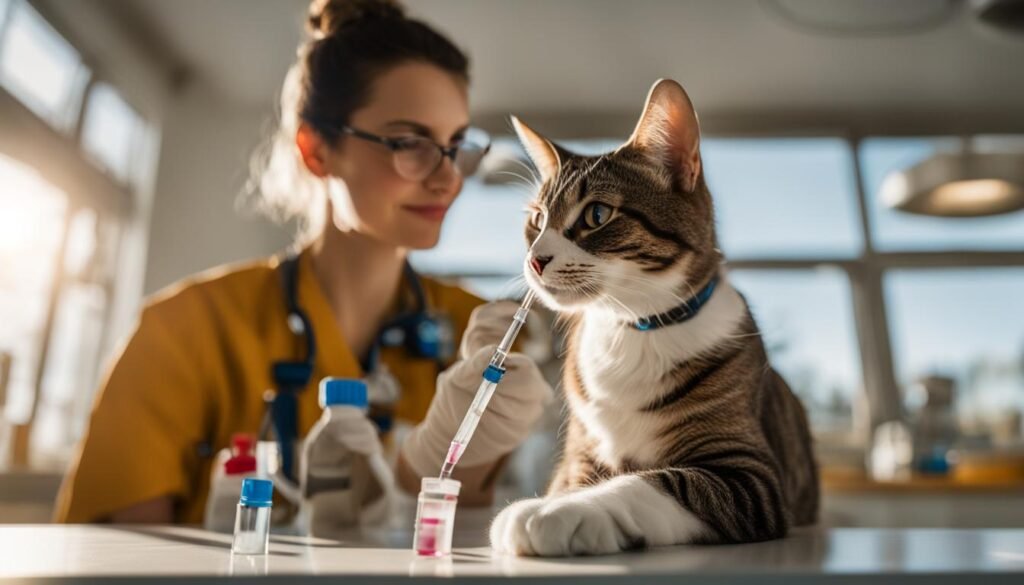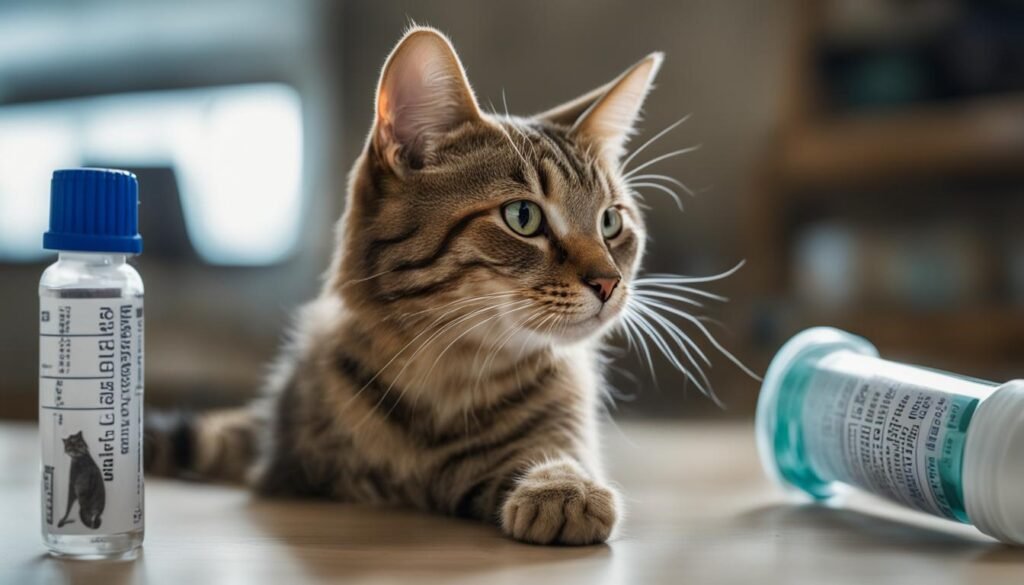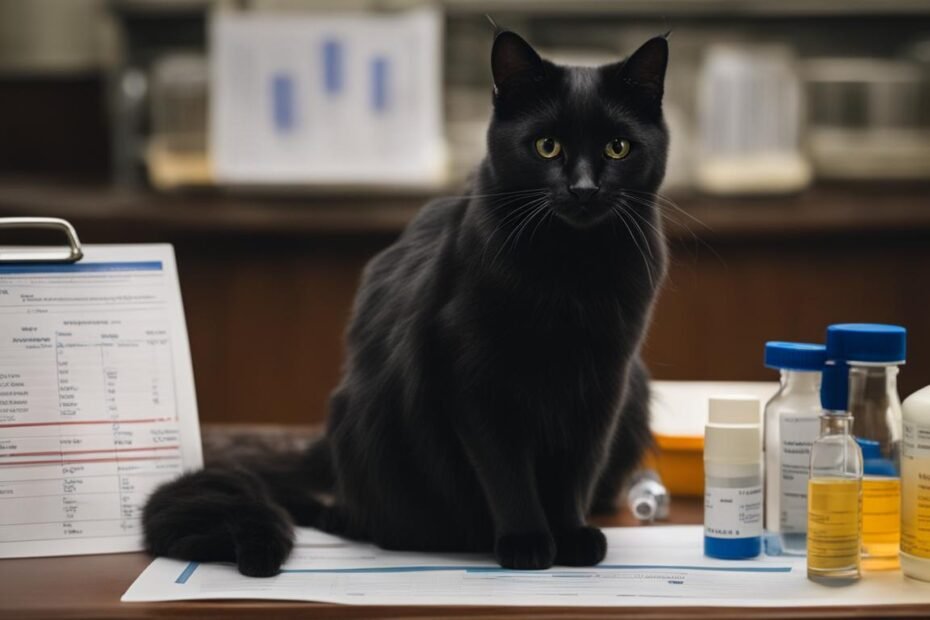Cat vaccinations are a crucial aspect of preventive care for our feline friends. They help protect cats from various diseases and minimize the risk of severe illness. Vaccines work by training the cat’s immune system to recognize and fight off viruses and bacteria. While vaccines do not provide complete protection, they can help reduce the severity of symptoms if a cat does contract an illness. Vaccinations are necessary for both outdoor and indoor cats, as they help prevent the spread of diseases and protect other cats as well. The cat vaccination schedule may vary, but generally, kittens start their vaccine series around 6-8 weeks of age, with boosters every 3-4 weeks until they are about 16 weeks old. Adult cats need regular boosters every 1-3 years, depending on the vaccine and their lifestyle. The cost of cat vaccinations can vary, but they are generally an investment in the long-term health of your pet.
Key Takeaways:
- Cat vaccinations are essential for preventing diseases and minimizing the severity of illnesses.
- Vaccines train the cat’s immune system to recognize and fight off viruses and bacteria.
- Vaccinations are necessary for both outdoor and indoor cats to prevent the spread of diseases.
- Kittens should start their vaccine series at around 6-8 weeks of age, with boosters until they are about 16 weeks old.
- Adult cats need regular boosters every 1-3 years, depending on the vaccine and their lifestyle.
Why Do Cats Need Vaccines?
Vaccines are a critical line of defense for cats and an essential part of preventive care. They help prepare a cat’s immune system to recognize and fight off viruses and bacteria, reducing the risk of severe illness. Vaccinations do not prevent cats from being exposed to infectious diseases but help their bodies fight off the infection more effectively.
For outdoor cats or those living in multi-cat households, vaccinations are particularly crucial as they have a higher risk of exposure to potential pathogens. However, even indoor cats need vaccines as some viruses can be brought into the home through shoes or clothing. Vaccinating cats not only protects their health but also helps prevent the spread of diseases to other cats.
It is important for cat owners to understand the importance of vaccinations and prioritize their pet’s health. By staying up-to-date with vaccinations, cat owners can ensure that their feline companions have a higher likelihood of remaining healthy and resilient against potential diseases.

Vaccinating your cat is a responsible choice that not only protects their individual health but also contributes to the larger goal of preventing the spread of diseases within the feline population. By following the recommended vaccination schedule and consulting with a veterinarian, cat owners can provide their pets with the best possible protection against preventable diseases.
The Importance of Vaccinations:
- Vaccines help prepare a cat’s immune system to fight off viruses and bacteria.
- Vaccinations reduce the risk of severe illness in cats.
- Vaccinating cats protects their health and helps prevent the spread of diseases to other cats.
- Outdoor cats and those living in multi-cat households have a higher risk of exposure to potential pathogens and need vaccinations.
- Vaccinations are also essential for indoor cats as viruses can be brought into the home.
By understanding the importance of vaccinations and following the recommended vaccination schedule, cat owners can help ensure the health and well-being of their beloved feline companions.
| Vaccine Type | Benefits |
|---|---|
| Core Vaccines | Provide protection against highly contagious and potentially severe diseases such as rabies, feline viral rhinotracheitis, calicivirus, and panleukopenia. |
| Non-Core Vaccines | Recommended based on a cat’s individual needs, lifestyle, and risk factors. Examples include feline leukemia virus, chlamydia felis, bordetella bronchiseptica, and feline coronavirus. |
“Vaccinating your cat is one of the most effective ways to protect their health and prevent the spread of contagious diseases. By following the recommended vaccination schedule and consulting with a veterinarian, you can provide your cat with the best possible care.” – Dr. Emily Johnson, DVM
Core vs. Non-core Vaccines: What Vaccines Do Cats Need?
When it comes to cat vaccinations, it’s important to understand the difference between core and non-core vaccines. Core vaccines are considered essential for all cats, regardless of their lifestyle or living conditions. These vaccines protect against highly contagious and potentially severe diseases that can pose a risk to both the cat and other animals. On the other hand, non-core vaccines are recommended based on a cat’s individual needs, lifestyle, and risk factors.
Core Vaccines:
Core vaccines provide crucial protection against diseases that every cat should be vaccinated against. They include:
| Vaccine | Diseases Prevented |
|---|---|
| Rabies Vaccine | Rabies |
| FVRCP Vaccine | Feline viral rhinotracheitis, calicivirus, and panleukopenia |
Non-core Vaccines:
Non-core vaccines are recommended based on a cat’s individual circumstances and may vary depending on factors such as geographic location and lifestyle. Some examples of non-core vaccines include:
- Feline Leukemia Virus Vaccine
- Chlamydia Felis Vaccine
- Bordetella Bronchiseptica Vaccine
- Feline Coronavirus Vaccine
It is important to consult with your veterinarian to determine which vaccines are appropriate for your cat based on their specific circumstances. Your vet will consider factors such as your cat’s age, health, lifestyle, and potential exposure to certain diseases. They will recommend the necessary vaccines to ensure your cat receives the appropriate protection against preventable diseases.
Understanding Core Vaccines for Cats
In this section, we will explore the core vaccines that are essential for the health and well-being of cats. These vaccines provide vital protection against highly contagious and potentially severe diseases. Understanding the importance of these core vaccines and their role in safeguarding your cat’s health is crucial.
Rabies Vaccine
The rabies vaccine is a core vaccine for cats and is required by law in many areas. Rabies is a fatal viral disease that affects the nervous system of cats, as well as humans and other animals. Vaccinating your cat against rabies not only protects their health but also helps prevent the spread of this deadly disease.
FVRCP Vaccine
The FVRCP vaccine is a combination vaccine that provides protection against three common diseases: feline viral rhinotracheitis, calicivirus, and panleukopenia. Feline viral rhinotracheitis is a major cause of upper respiratory infections in cats, while calicivirus can cause respiratory infections and oral diseases. Panleukopenia is a highly contagious and often fatal disease that affects the gastrointestinal system. The FVRCP vaccine is a crucial part of your cat’s preventive care plan.

By ensuring that your cat receives these core vaccines, you are providing them with the necessary protection against these diseases. Remember to consult with your veterinarian to determine the appropriate vaccination schedule and to discuss any concerns you may have about your cat’s health.
Non-Core Vaccines for Cats
Non-core vaccines are additional vaccines that are recommended based on a cat’s individual needs and risk factors. These vaccines provide extra protection against specific diseases that may be more prevalent in certain environments or lifestyles. While not considered essential for all cats, they can be crucial in certain situations. Here are some examples of non-core vaccines for cats:
- Feline Leukemia Vaccine: The Feline Leukemia (FeLV) vaccine is recommended for cats at risk of exposure, especially those who spend time outdoors or interact with other cats. FeLV is a contagious virus that can weaken a cat’s immune system and lead to serious health issues.
- Chlamydia Felis Vaccine: The Chlamydia felis vaccine helps protect against respiratory infections caused by the bacteria Chlamydophila felis. This bacterium is a common cause of conjunctivitis and upper respiratory infections in cats.
- Bordetella Bronchiseptica Vaccine: The Bordetella bronchiseptica vaccine is recommended for cats in multi-cat environments or shelters. It helps prevent respiratory diseases caused by the bacterium Bordetella bronchiseptica, which can spread quickly among cats in close proximity.
- Feline Coronavirus Vaccine: The Feline coronavirus vaccine is sometimes administered, although it is not commonly given due to challenges in diagnosing and treating Feline Infectious Peritonitis (FIP), a potentially fatal systemic disease caused by the virus.
It’s important to discuss non-core vaccines with your veterinarian to determine their relevance for your cat’s health. Your vet can assess your cat’s lifestyle, environment, and potential exposure risks to recommend the appropriate non-core vaccines. Remember, each cat is unique, and their vaccination needs may vary.
| Vaccine | Benefits | Recommended for |
|---|---|---|
| Feline Leukemia Vaccine | Protection against feline leukemia virus | Cats at risk of exposure, outdoor cats, cats in multi-cat households |
| Chlamydia Felis Vaccine | Prevention of respiratory infections caused by Chlamydophila felis | Cats at risk of exposure, cats in close contact with other cats |
| Bordetella Bronchiseptica Vaccine | Prevention of respiratory diseases caused by Bordetella bronchiseptica | Cats in multi-cat environments, cats in shelters |
| Feline Coronavirus Vaccine | Possible protection against Feline Infectious Peritonitis (FIP) | Considered in specific cases, as recommended by a veterinarian |
Cat Vaccination Schedule and Potential Costs
Properly vaccinating your cat is essential for their overall health and wellbeing. Vaccines help protect them from various diseases and can significantly reduce the severity of symptoms if they do become infected. Understanding the cat vaccination schedule and the associated costs is crucial for every cat owner.
The cat vaccination schedule typically starts when kittens are around 6-8 weeks old. They receive a series of vaccines with boosters every 3-4 weeks until they reach approximately 16 weeks of age. This initial vaccine series is vital for building their immunity and protecting them against common diseases. As adult cats, they will need regular booster shots every 1-3 years, depending on the vaccine and their vaccination status.
The costs of cat vaccinations can vary depending on different factors. Geographic location and individual veterinary practices can influence the price range. On average, core vaccines such as the rabies and FVRCP vaccines can cost between $20 and $75 per vaccine. Non-core vaccines may have different price ranges. It’s important to consider the cost of vaccinations as an investment in your cat’s long-term health, as treating the illnesses they prevent can be much more expensive.
| Vaccine Type | Recommended Frequency | Approximate Cost |
|---|---|---|
| Rabies | Every 1-3 years | $20-$75 |
| FVRCP | Every 1-3 years | $20-$75 |
| Feline Leukemia | Annually or as recommended | Varies |
| Chlamydia Felis | Annually or as recommended | Varies |
| Bordetella Bronchiseptica | Annually or as recommended | Varies |
It’s important to consult with your veterinarian to determine the appropriate vaccines for your cat and their specific circumstances. They will be able to provide guidance on the vaccination schedule and advise on any additional vaccines that may be necessary based on your cat’s lifestyle and risk factors.
Conclusion
Cat vaccinations are vital for maintaining the health and well-being of our beloved feline companions. By protecting them from contagious diseases, vaccinations play a crucial role in safeguarding not only your cat’s health but also that of other cats they come into contact with.
Make sure to prioritize core vaccines such as rabies and FVRCP, as they are recommended for all cats. Additionally, consult with your veterinarian to determine the necessity of non-core vaccines based on your cat’s individual circumstances.
Remember, the cost of vaccinations is a worthwhile investment in your pet’s long-term health. By staying up-to-date with vaccinations, you can provide your cat with the best possible protection against common feline diseases, promoting their overall well-being.
FAQ
Why are cat vaccinations important?
Cat vaccinations are important because they help protect cats from various diseases and minimize the risk of severe illness. Vaccines train the cat’s immune system to recognize and fight off viruses and bacteria, reducing the severity of symptoms if the cat does contract an illness. Vaccinations also help prevent the spread of diseases and protect other cats.
Do indoor cats need vaccinations?
Yes, indoor cats still need vaccinations because some viruses can be brought into the home through shoes or clothing. Vaccinating indoor cats helps protect their health and prevents the spread of diseases to other cats.
What are core and non-core vaccines for cats?
Core vaccines are essential for all cats and protect against highly contagious and potentially severe diseases such as rabies, feline viral rhinotracheitis, calicivirus, and panleukopenia. Non-core vaccines are recommended based on a cat’s individual needs, lifestyle, and risk factors.
What are the core vaccines for cats?
The core vaccines for cats include the rabies vaccine and the FVRCP vaccine. Rabies vaccine is required by law in many areas and protects against a fatal viral disease. The FVRCP vaccine is a combination vaccine that protects against feline viral rhinotracheitis, calicivirus, and panleukopenia.
What are non-core vaccines for cats?
Non-core vaccines for cats include the feline leukemia vaccine, chlamydia felis vaccine, bordetella bronchiseptica vaccine, and feline coronavirus vaccine. These vaccines are recommended based on a cat’s individual needs and risk factors.
When should I start vaccinating my kitten?
Kittens should start their vaccine series around 6-8 weeks of age, with boosters every 3-4 weeks until they are about 16 weeks old.
How often do adult cats need boosters?
Adult cats typically need regular boosters every 1-3 years, depending on the vaccine and their lifestyle.
How much do cat vaccinations cost?
The cost of cat vaccinations can vary depending on factors such as geographic location and individual veterinary practices. On average, the cost of core vaccines ranges from $20 to $75 per vaccine, while non-core vaccines may vary.
